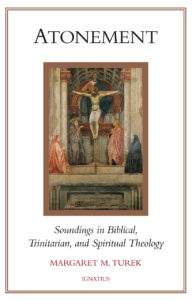Podcast: Play in new window | Download (Duration: 39:42 — 27.4MB) | Embed
Subscribe: Apple Podcasts | Spotify | Amazon Music | Android | Pandora | iHeartRadio | JioSaavn | Podchaser | Gaana | Podcast Index | Email | TuneIn | Deezer | Anghami | RSS | More

Loving the Excommunicate – Atonement: Soundings in Biblical, Trinitarian, and Spiritual Theology
Discerning Hearts presents a series of conversations between Dr. Margaret Turek and Evan Collins about her book, “Atonement: Soundings in Biblical, Trinitarian, and Spiritual Theology.”
 You can pick up a copy of the book here:
You can pick up a copy of the book here:
An excerpt from the book:
“As if anticipating a too-narrow interpretation of the words “our” and “us” in these New Testament texts and the enveloping commentary, the Catechism immediately adds: “At the end of the parable of the lost sheep Jesus recalled that God’s love excludes no one: ‘So it is not the will of your Father who is in heaven that one of these little ones should perish’ (Mt 18:14). He affirms that he came ‘to give his life as a ransom for many’; this last term is not restrictive, but contrasts the whole of humanity with the unique person of the redeemer who hands himself over to save us (Mt 20:28; cf. Rom 5:18–19).”35 With unmistakable consistency, from paragraph no. 50 through no. 618 and beyond, the Catechism interprets the biblical testimony as refraining from placing restrictions on God’s love for sinners. Instead, it avows the universal scope of “the Father’s plan of divine salvation” in sending his Son as atonement for the sins of all, for the sake of all, for love of all.”Turek, Margaret. Atonement: Soundings in Biblical, Trinitarian, and Spiritual Theology (pp. 128-129). Ignatius Press. Kindle Edition.
From the book’s description:
“This book presents the chief insights concerning the mystery of atonement in the works of four theological guides: John Paul II, Joseph Ratzinger/Benedict XVI, Hans Urs von Balthasar, and Norbert Hoffmann.
The author argues for the central importance and perennial value of a theology of atonement, even as she explains the modern aversion to it. The book’s central aim is to deepen our understanding of the biblical claim that God shows himself to be love precisely by sending his Son as atonement. “In this is love: not that we loved God, but that he loved us and sent his Son as expiation for our sins” (1 Jn 4:10).
The book develops a compelling vision of atonement as a process that originates from and is engendered by God’s own power to love. This vision not only takes account of the gravity of sin and its consequences but also provides a clear illumination of the wholly gratuitous, radically forgiving, passionate and powerful nature of God’s redeeming love for mankind. Distinct from the majority of theological accounts of atonement, which focus almost exclusively on the role of Christ, this book highlights the role of God the Father in the atoning mission of the Son.”

